The following articles of belief are the most important concepts in Orthodox theology. We attempt to teach them here in an extremely condensed but clear manner. There are countless books on each of these subjects, so further study will most likely be necessary. If you are new to Orthodoxy, they are intended to be read in order from beginning to end. We also invite you to jump around as you see fit.
The God Trinity
God is both Essence and Energy
God the Father
God the Son (Jesus Christ)
God the Holy Spirit
Grace
The Human Trinity
Salvation
The Church
Holy Scripture
The Sacraments
The Second Coming
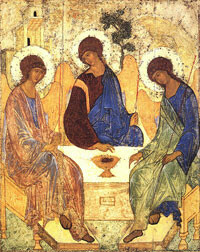
We believe and worship the One living and true God who revealed Himself to us as a Holy Trinity of three divine persons, that of the Father, Son, and Holy Spirit. We believe that each divine person is of equal essence (or nature), and that "God is Spirit, and those who worship Him must worship in spirit and truth." (John 4:24)
We believe that God is not an impersonal essence or mere "higher power;" but rather, each of the divine persons relates to mankind personally.
God's Essence is awesome and unapproachable for man: ‘Never shall a man see My face and live’ (Exod. 33:20); and again, He dwells "in unapproachable light, whom no man has seen or can see" (1 Tim 6:16).
God's Energies are also God Himself, but without being His Essence (or nature). Filled with divine love for His creation, God comes out of Himself and seeks to unite with us in His uncreated Energies. God's Energies are also called Divine Grace, and they are ministered to us through God the Holy Spirit.
We believe in God the Father, who is the First Person and source of the Holy Trinity, the maker of heaven and earth, and of all things visible and invisible.
We believe God the Father created all things through the Son and in the Holy Spirit (Genesis 1 and 2; John 1:3; Job 33:4). God the Father loves us and concerns Himself mercifully in the affairs of His people. He hears our prayers and sent His Son to give us everlasting life (John 3:16).
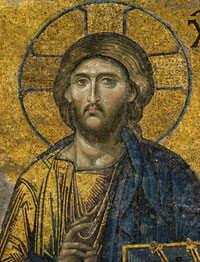
We believe in Jesus Christ who is the incarnate Second Person of the Holy Trinity; the only begotten Son of God; fully created human and fully uncreated God; born in time of the Virgin Mary (when assuming humanity), and begotten from before all time of God the Father.
Being a God-Man (i.e. fully human and fully God), Jesus Christ completely identified with the human condition except for sin, and through His sinless death and resurrection, He raised fallen humanity back into communion with Himself (The God Trinity). Jesus Christ not only reveals the Father to us but also offers salvation to all.
We believe in God the Holy Spirit, the Third Person of the Holy Trinity, who eternally proceeds from the Father (John 15:26), and who connects to all creation through His uncreated Energies (Grace).
We believe the Holy Spirit was sent by Christ Jesus to convict the world of sin, righteousness, and judgment (John 16:8); and to also regenerate, sanctify, unite, and empower all those baptized in Christ.
Grace is a general term referring to the uncreated Energies of God Himself, which are ministered to us by God the Holy Spirit both externally and internally.
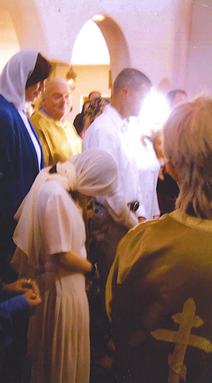 External Grace is ministered to all creation, and also involves a variety of salvific activities which bring those who are willing to God the Son with the intention of regenerating them into the Body of Christ through Holy Baptism.
External Grace is ministered to all creation, and also involves a variety of salvific activities which bring those who are willing to God the Son with the intention of regenerating them into the Body of Christ through Holy Baptism.
Internal Grace is ministered at Baptism and increases through the ascetical and sacramental life of the Church, mainly through Holy Communion and Prayer. Having been imbued with the uncreated Energies of God the Holy Spirit (Internal Grace), the newly illumined person is given access to God the Father.
We believe that God the Holy Spirit dwells in every Orthodox Christian through Internal Grace (see incredible photo of newly baptized to the right), and that each one's body is His temple (1 Corinthians 3:16); and that He is an abiding helper, teacher, protector, and guide leading the faithful in the way of all truth. Those who are outside of the Church experience God the Holy Spirit through His External Grace, often exhibiting God-like activities, but it is only through baptism and an active life within the Orthodox Church that someone may experience the ever-increasing Internal Grace of God within themselves.
Please read the following article to learn more: The Orthodox View of Grace (God's Uncreated Energies)
We believe that God made Adam (humanity) in His image and likeness, and placed him in the Garden of Eden (Genesis 1:26). Being a Trinity of three Divine Persons, God made Adam in His image as a Trinity of body (visible), soul (invisible), and spirit (invisible). Three separate creations with distinct functions, all combining into one Human Person. As we grow in Christ, we're able to discern the attributes and capabilities of each part of our Human Trinity, especially through Holy Communion, Prayer, and internal Grace.
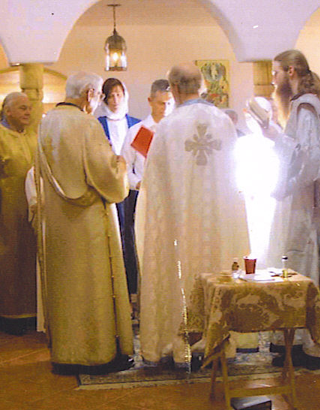 In the Garden of Eden, the Grace of the Holy Spirit dwelt inside of Adam through the capabilities of his spirit (see photo to the right), until he disobeyed God; as a consequence of losing this internal Grace, Adam suffered corruption (life without the Holy Spirit inside him), death (the consequence of sin), and Hades (the location of sin-loving souls separated from God).
In the Garden of Eden, the Grace of the Holy Spirit dwelt inside of Adam through the capabilities of his spirit (see photo to the right), until he disobeyed God; as a consequence of losing this internal Grace, Adam suffered corruption (life without the Holy Spirit inside him), death (the consequence of sin), and Hades (the location of sin-loving souls separated from God).
Jesus Christ healed humanity's corruption at His incarnation, overcame sin and death by His sinless passion, and opened the gates of Hades by His resurrection. The only way for us to also participate in Jesus' passover from death to life is through Faith, Baptism, and Chrismation (Confirmation), which also restores within us the internal Grace of the Holy Spirit; that being said, salvation itself is a life-long process since every person continues to sin after baptism. We, therefore, need continual healing from the Church in the form of sacraments and prayer, and also through our diligence to be living a God-pleasing way of life.
Today, many people proclaim a date - or even an event - when they believe they were 'saved' by Jesus Christ through their acceptance of Him into their lives as Lord and Savior. No where in the Bible – or the pre-schismatic history of the Church – does it teach that our salvation is a one-time event; rather, salvation is a life-long process as described above, which includes faith and baptism into the Body of Christ, and continuing to our very last breath as we live and grow in the sacramental and liturgical life of the Body of Christ, His Church.
Salvation is the Deification process (Theosis)
We believe we were saved when Jesus Christ was incarnated and resurrected. We believe we are being saved by our daily diligence to His commandments, and through the healing sacramental life of the Orthodox Church, and we believe we will be saved at His second glorious and dreadful coming. This process of salvation is called deification, or theosis, or simply, becoming more like God through our increasing acquisition of internal Grace (i.e. the uncreated energies of God the Holy Spirit).
Please read the following article to learn more: What Christ Accomplished on the Cross.
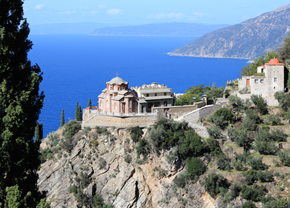 The Church, now referred to as the Orthodox Church, is the one true Church founded by Jesus Christ and his Apostles, with Jewish roots, whose heritage reaches beyond Judaism to the creation of humanity in the Garden of Eden, and even further back as the eternal 'Bride' and 'Body' of God the Son, Jesus Christ.
The Church, now referred to as the Orthodox Church, is the one true Church founded by Jesus Christ and his Apostles, with Jewish roots, whose heritage reaches beyond Judaism to the creation of humanity in the Garden of Eden, and even further back as the eternal 'Bride' and 'Body' of God the Son, Jesus Christ.
The ancient Church, and indeed all believing humanity, was transfigured and regenerated through the incarnation, death, and resurrection of Jesus Christ, and at the day of Pentecost with the descent of the Holy Spirit in the year 33 A.D.
The Orthodox Church is also known (especially in the contemporary West) as the Eastern Orthodox Church or the Greek Orthodox Church. It may also be called the Orthodox Catholic Church, the Orthodox Christian Church; the One, Holy, Catholic, and Apostolic Church; the Body of Christ, the Bride of Christ, or simply the Church.
Its primary statement of faith is the Nicene-Constantinopolitan Creed (381 AD).
Its foundation by the Apostles is outlined here: A Word About Church History
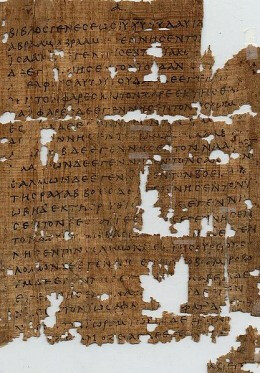
We believe that the Holy Bible is a collection of books written over multiple centuries by the prophets and Apostles in human language, inspired by God the Holy Spirit, and collected, edited, and canonized by the Orthodox Church in the synods of Hippo (393 AD) and Carthage (397 AD). Above all, the Bible is a faith document. The New Testament was written by the Orthodox Church, who has throughout the centuries consistently interpreted, taught, and lived its Biblical tradition.
God is the only source of infallibility, and since God the Holy Spirit inspired the Bible, it only makes sense that God the Holy Spirit may infallibly interpret it. Jesus Christ promised to the Church's first Bishops, the Apostles, that the Holy Spirit would guide them (i.e. the Bishops) into all truth (John 16:13); therefore, the Orthodox Church continues to interpret the Holy Bible that it compiled and canonized according to past 2,000 years of oral, liturgical, ecumenical, and experiential God-inspired interpretation; and also in regards to the patristic teachings of the Holy Church Fathers.
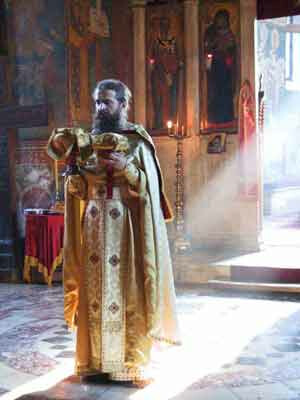
The holy mysteries or sacraments of the Orthodox Church are vessels of divine Grace, and just like the Son of God, they have both visible (created) and invisible (uncreated) realities.
Jesus of Nazareth appeared as just another human being (except during His Transfiguration on Mt. Tabor); nevertheless, He is the Son of God being fully Man, and fully God. His divinity was not seen by the human eye (except through his miracles), but His humanity was. Even today, His divine reality is only revealed to us through Faith. It's exactly the same with every mystery or sacrament. Every sacrament is a combination of an outward visible sign with a simultaneous invisible spiritual reality.
Baptism: We see water in a font, yet invisibly it becomes our death, burial, resurrection, and adoption into the Body of Christ.
Chrismation (Confirmation): We see anointing oil, yet invisibly it becomes our reception and seal of the internal Grace of the Holy Spirit.
Communion: We see bread and wine, yet invisibly they become the body and blood of the Christ.
Confession: We feel the multitude of our dreadful sins weighing heavily upon us, and so we confess them with a crushed and humbled heart before God. Through the prayer of a Priest standing over us, they are invisibly loosed from us forever.
Marriage: We see two separate people standing before the altar of God, yet invisibly they become mystically connected as one body.
Unction: We see anointing oil, yet invisibly it becomes the physical and spiritual healing of our sicknesses.
Ordination: We see a man kneeling before the Bishop, yet invisibly he becomes endowed with a special Grace to shepherd the flock of Christ.
There isn't a set list of sacraments since the Orthodox Church generally considers everything in and of the Church to be a mystery or sacrament.
The most commonly mentioned ones are the seven listed above. For more information on each, please read the following articles:
Baptism
Chrismation (confirmation)
Communion
Confession
Marriage
Unction (anointing the sick)
Ordination
We believe according to the Nicene-Constantinopolitan Creed that "we look for the resurrection of the dead" when Jesus Christ "will come again with glory to judge the living and dead. His kingdom shall have no end."
We also believe that the Judgement of humanity will take place according to the Gospel of Matthew, Chapter 25:31-46, as follows:
31 “When the Son of Man comes in His glory, and all the holy angels with Him, then He will sit on the throne of His glory. 32 All the nations will be gathered before Him, and He will separate them one from another, as a shepherd divides his sheep from the goats. 33 And He will set the sheep on His right hand, but the goats on the left. 34 Then the King will say to those on His right hand, ‘Come, you blessed of My Father, inherit the kingdom prepared for you from the foundation of the world: 35 for I was hungry and you gave Me food; I was thirsty and you gave Me drink; I was a stranger and you took Me in; 36 I was naked and you clothed Me; I was sick and you visited Me; I was in prison and you came to Me.’ 37 “Then the righteous will answer Him, saying, ‘Lord, when did we see You hungry and feed You, or thirsty and give You drink? 38 When did we see You a stranger and take You in, or naked and clothe You? 39 Or when did we see You sick, or in prison, and come to You?’ 40 And the King will answer and say to them, ‘Assuredly, I say to you, inasmuch as you did it to one of the least of these My brethren, you did it to Me.’ 41 “Then He will also say to those on the left hand, ‘Depart from Me, you cursed, into the everlasting fire prepared for the devil and his angels:42 for I was hungry and you gave Me no food; I was thirsty and you gave Me no drink; 43 I was a stranger and you did not take Me in, naked and you did not clothe Me, sick and in prison and you did not visit Me.’ 44 “Then they also will answer Him, saying, ‘Lord, when did we see You hungry or thirsty or a stranger or naked or sick or in prison, and did not minister to You?’ 45 Then He will answer them, saying, ‘Assuredly, I say to you, inasmuch as you did not do it to one of the least of these, you did not do it to Me.’ 46 And these will go away into everlasting punishment, but the righteous into eternal life.”
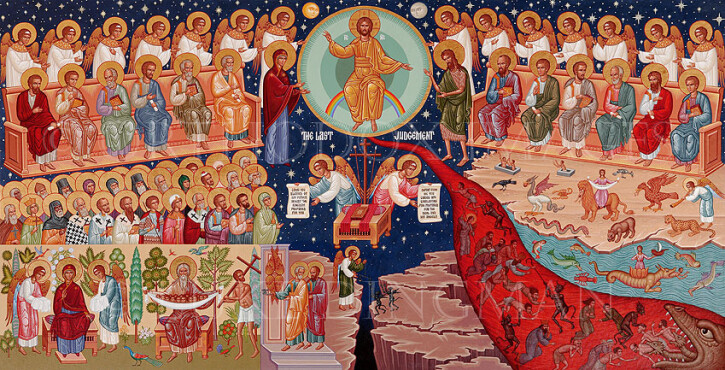
©2025 Sts. Kosmas & Damianos Greek Orthodox Church / Rochester's Orthodox Church
Powered by Ekklesia 360